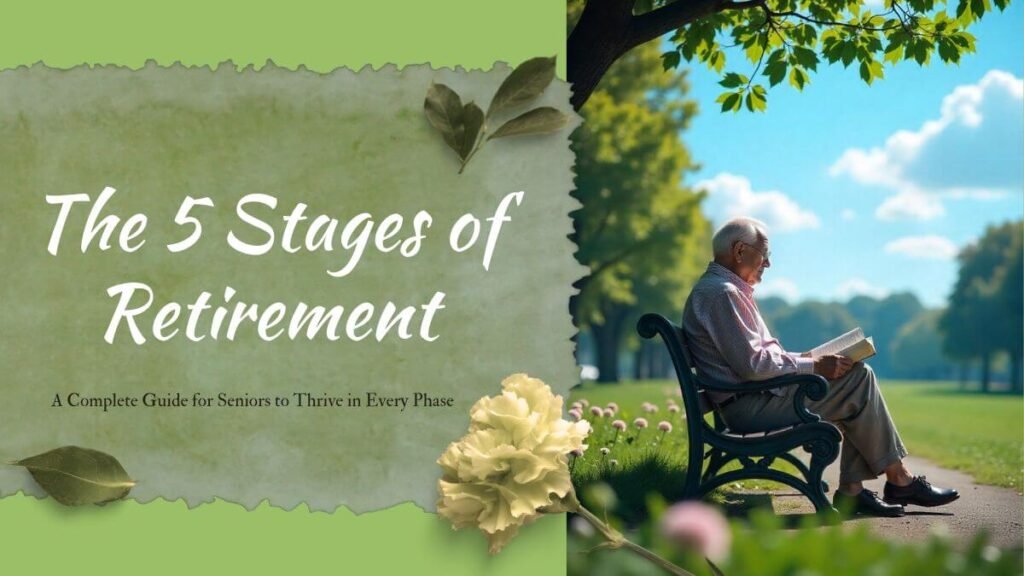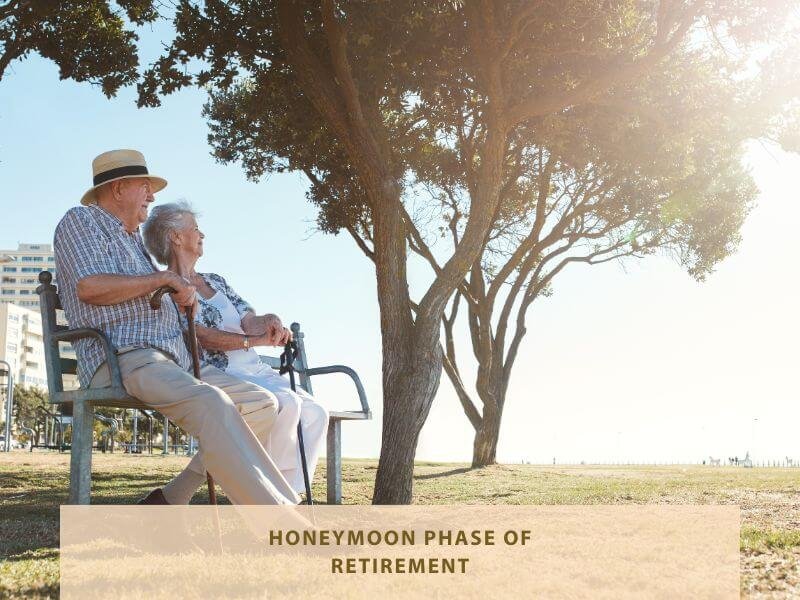Last Updated on: October 29, 2025 by Carlos P. Barry

Retirement is often seen as the “golden chapter” of life—a time to relax, enjoy freedom, and explore passions. But the truth is, this stage also brings unique emotional, financial, and lifestyle challenges. Many retirees describe this journey through distinct experiences often referred to as the Stages of Retirement, with each stage shaping how they feel, think, and live.
Psychologists and financial experts have long studied the phases of retirement, and while experiences differ from person to person, most retirees pass through five key stages: Preparation, Retirement Day, Honeymoon, Disenchantment/Depression, and Reorientation/New Routine.
This guide explores each stage in detail, provides practical tips for seniors, shares real-world examples, and answers common questions. Whether you’re approaching retirement or already living it, understanding these stages can help you prepare, adapt, and truly enjoy this new season of life.
KEY SYNOPSIS

- Stages of retirement includes planning guideline on retirement, how to spend free time during retirement, best part of the retirement, how to deal with depression, how to maintain the new daily routine and so on.
- Don’t treat the retirement phase as an ending of your life, rather it’s a beginning of a new journey to see the world from a different angle.
- Depression may come around you but you should overcome those through the inherent inspiration of enjoying life. Also you need to consider various Post Retirement Activities.
- This is the time of self-actualization, and it is only possible through nurturing various hobbies and sharing life-long experiences and expertise with young members of the society.
What Are the Stages of Retirement: Have a Brief Discussion over Those Stages
Many experts debate on the stages; Now, economists & psychologists have taken this time very seriously. People used to study the mental state during marriage, childbirth, school-time, or teenage; but what about the common retirement phase, which we all will face definitely once our life? So let’s dig down a little more and know the five stages here:
Stage 1: The Preparation Phase (Planning for Retirement)
That’s the first stage which begins a long time before retirement; this phase begins after a person’s 50s or middle age. When the person knows that he/she will be retired within a few years, he starts to save money for old age or their children and family; some of them put the kids in renowned colleges to set them.

Is that enough to plan life after retirement or you need to add some more thoughts?
You must think of other things like where you want to live after retirement, how you will spend your life or planning a small business to be financially independent.
Moreover, you must have a plan to use the retirement money for a purpose, & what things would you do after your farewell. So you can think about the following areas for pre-retirement planning:
Key Areas to Focus On
- Financial Planning
- Review retirement savings accounts, pensions, and Social Security benefits.
- Investopedia: Retirement Planning Basics offers detailed guides.
- Consider meeting with a financial advisor to calculate how much you’ll need.
- Plan for inflation and unexpected medical expenses.
- Housing Decisions
- Will you stay in your current home, downsize, or relocate to a retirement community?
- Explore options like AARP’s Housing Solutions for seniors.
- Health & Insurance
- Secure Medicare or supplemental insurance. Learn more at Medicare.gov.
- Plan for long-term care options—whether at home, assisted living, or nursing care.
- Lifestyle & Purpose
- Think beyond money: What will give your days meaning?
- Explore hobbies, part-time work, or volunteering. (👉 See our guide: Best Hobbies for Seniors to Stay Active and Engaged)
- Family Considerations
- Will you support adult children or aging parents?
- Have conversations with loved ones about expectations.
💡 Real Example: Susan, a 58-year-old teacher, began preparing five years before retirement. She boosted her retirement savings, paid off her mortgage, and started volunteering at her local library. When she retired, she already had a fulfilling routine and a sense of purpose.
✅ Tip: Don’t just save money—invest time in envisioning your retirement lifestyle. Write down what an ideal day looks like for you.oning your retirement lifestyle. Write down what an ideal day looks like for you.
Stage 2: Retirement Day (The Big Transition)
That’s a big day actually. This is the official closure of your work life. But definitely it’s not the ending of your work life in reality. Once you reach the retirement period, you may have to fulfil many formalities; you will have some paper works done (especially when you willingly retire before the time comes), you have to go through with lots of emotions, smiles, best wishes, handshakes and finally, the farewell or other relevant programs will take place for you; you will have to participate in the festivities and absolutely those are enjoyable. Moreover, you can follow below checklist to make sure your last moments activities:

What Happens on Retirement Day?
- Farewell parties and ceremonies
- Emotional goodbyes to colleagues
- Paperwork and benefits processing
- A sense of “being in the spotlight”
🎉 Retirement Day Checklist:
- Finalize paperwork for pensions, retirement accounts, and insurance
- Gather contact details from colleagues and HR
- Write or give a farewell speech (a wonderful chance to share wisdom)
- Take time to celebrate with family and friends
💡 Case Study: My neighbor, a retired army officer, celebrated his retirement at 55 with a full military ceremony. Instead of slowing down, he transitioned into running a small business. His energy and purpose showed that retirement is not an ending, but the start of a new chapter.
✅ Tip: Capture the moment. Take photos, journal about the day, or host a family dinner—it’s a milestone worth remembering.
Stage 3: The Honeymoon Phase (Freedom & Exploration)
You may be a little surprised with the term honeymoon because it’s used when a newly married couple goes on a trip immediately after their wedding. Now you may ask what is it & how does it return after your retirement; you can also refer the time as a vacation and absolutely one of the important stages of retirement.

You can visit your friends, relatives, siblings, or hang out with them to pass your leisure time; Some elderly people even prefer visiting their children or grandkids. Only visiting people is not a part of this phase; sometimes people roam or travel around the world with their respective partners.
Therefore, the time feels very exciting because people can do the things which they couldn’t during the busy life; So the advice is, enjoy your time as much as possible, but don’t spend all your savings.
Popular Activities in the Honeymoon Phase
- Traveling domestically or abroad (see our list of Best Travel Destinations for Retirees)
- Spending more time with children and grandchildren
- Exploring new hobbies (gardening, painting, photography, woodworking)
- Taking classes or learning new skills online—try Senior Planet for free tech and lifestyle courses
- Joining social clubs, fitness classes, or community groups
💡 Real Example: John and Mary, a retired couple, spent their first two years traveling across Europe. While the adventures were thrilling, they later realized the importance of pacing themselves financially and emotionally.
✅ Tip: Balance enjoyment with financial planning. It’s easy to overspend during this stage. Spread out major trips and experiences so the excitement lasts longer.
Stage 4: Reality Check / Disenchantment Phase (Dealing with Depression)
After the honeymoon glow fades, many retirees face a sobering reality: What now? Without the structure and purpose that work once provided, some seniors may begin to feel lost, unmotivated, or even depressed. This phase, often referred to as retirement depression, is one of the most challenging parts of the Stages of Retirement and is more common than many people realize.

Feelings of boredom, isolation, or a lack of direction can creep in, especially if there are no meaningful activities or social connections to fill the days. It’s important to recognize that these emotions are a normal part of the transition, not a personal failing. With the right strategies—such as creating a daily routine, engaging in hobbies, volunteering, or seeking professional support—seniors can overcome this stage and move toward a healthier, more fulfilling retirement.
Signs of Retirement Depression
- Persistent sadness or hopelessness
- Sleep problems (too much or too little)
- Loss of interest in activities once enjoyed
- Anxiety or difficulty concentrating
- Withdrawal from friends and family
Why This Happens
Work often provided structure, purpose, and social interaction. Without it, retirees may feel “unneeded” or disconnected.
💡 Real Example: George, a former engineer, struggled with depression one year into retirement. With encouragement from his family, he began teaching part-time at a community college. The opportunity gave him structure, social connection, and a renewed sense of purpose.
✅ Tips to Overcome Retirement Depression:
- Create a routine: Wake up at the same time, plan meals, and set daily goals.
- Stay active: Walk, practice yoga, or join a local fitness group (see our Unique Activities for Seniors Guide).
- Seek social connection: Volunteer, join clubs, or reconnect with old friends.
- Talk about it: Counseling or support groups can make a big difference—see National Institute on Aging: Mental Health and Older Adults.
- Explore new challenges: Lifelong learning, hobbies, or part-time work can add meaning.
📌 Expert Insight: Dr. Randall Paulsen, psychiatrist at Harvard-affiliated Brigham and Women’s Hospital, explains: “During that phase of going from a lot of structure to almost no structure, men can exhibit the same signs as someone who is overworked.” The key, he says, is creating new patterns of meaning.
Stage 5: Reorientation & Creating a New Routine
At this stages of retirement, you are now used to your new life where depression must be wiped out. You should be reoriented to your new life where you can take care of your hobbies first. Gradually you will realize that society needs you as the most experienced personnel. You can join some associations of elderly & retired people; Also you can think about various low stress jobs to keep you dynamic. You may also work as a social senior citizen.

This stage of life, retirement, isn’t actually a perpetual rest after all; Sometimes you will be bored & tired, you will face loneliness, sometimes it seems you are useless and those feelings let you down. However, you must start to rearrange your life again to enjoy the maximum time. Please don’t be hopeless about living your life.
Retired people usually get used to their new life & routine in this phase; the stage is everlasting for the rest of the person’s life. Anyway, taking care of health is one important part on this stage; proper diet management, regular medical check-ups, & treatments because many chronic diseases can catch you.
The final stage of retirement is about finding balance. Here, retirees adapt to their new reality, creating a routine that brings stability, fulfillment, and joy.
What This Stage Looks Like
- A stable daily schedule (exercise, hobbies, rest, and social time)
- Renewed sense of identity and purpose
- Engagement in meaningful activities (mentoring, volunteering, or part-time work)
- Improved emotional well-being
- Focus on health and relationships
💡 Real Example: Linda, a retired nurse, struggled during her first year. But once she joined a senior book club and began mentoring nursing students online, she rediscovered joy and fulfillment.
✅ Tips for Thriving in This Stage:
- Prioritize health: Regular checkups, balanced diet, and daily exercise (👉 see our Best Protein Drinks for Seniors Guide)
- Stay socially connected: Attend community events, join clubs, or volunteer
- Keep learning: Take online courses or workshops at Coursera for Seniors
- Explore financial independence: Small business ventures, consulting, or freelance work
- Practice gratitude: Journaling daily positives can boost emotional well-being
Comparison Table: Stages of Retirement at a Glance
| Stage | Emotions | Typical Activities | Challenges | Tips for Success |
|---|---|---|---|---|
| Preparation | Hopeful, sometimes anxious | Saving, planning, lifestyle design | Financial worries, uncertainty | Plan early, set goals, secure healthcare |
| Retirement Day | Excited, proud, nervous | Farewells, ceremonies, family celebrations | Anxiety about “what’s next” | Celebrate the milestone, capture memories |
| Honeymoon Phase | Joy, freedom, adventure | Travel, hobbies, family time, learning | Overspending, burnout | Pace activities, budget wisely |
| Reality Check | Boredom, sadness, loneliness | Struggling to fill time, possible depression | Loss of purpose, social isolation | Create routines, seek support, stay active |
| Reorientation | Contentment, balance, renewed focus | Volunteering, hobbies, part-time work | Staying consistent with new habits | Prioritize health, stay social, keep learning |
FAQs About Retirement Stages
How long do the stages of retirement last?
The timeline varies. The honeymoon phase may last months or years, while the disenchantment stage could be brief or prolonged. Each retiree’s experience is unique.
Is it normal to feel depressed after retiring?
Yes. Many retirees struggle with a loss of identity and structure. Recognizing this as part of the stages of retirement can help normalize the experience and guide you toward coping strategies.
Can retirees skip a stage?
Some may not experience every stage distinctly. For example, highly prepared individuals may transition smoothly from the honeymoon stage to stability without significant disenchantment.
What’s the hardest stage of retirement?
For many, the disenchantment stage is the most challenging due to feelings of purposelessness. However, with proactive planning, this stage can be minimized.
Can retirees work part-time?
Absolutely. Many retirees enjoy part-time work, freelancing, or consulting. It provides extra income and keeps the mind sharp.
What is the best way to enjoy retirement?
Balance. Manage finances wisely, maintain health, stay socially engaged, and pursue activities that bring joy and purpose.
Retirement is not the end of the road—it’s a new beginning. Like any major life transition, it comes with stages: planning, celebration, excitement, doubt, and ultimately, balance.
By understanding these phases and preparing for them, seniors can make retirement a time of growth, joy, and fulfillment. Remember: the key to thriving isn’t just financial security, but also purpose, connection, and health.
Think of retirement as an opportunity to reinvent yourself, share your wisdom, and enjoy life’s simple pleasures. With the right mindset, the golden years can truly shine.
🌟 Final Thought: Retirement is not about slowing down—it’s about living differently. The best years can still be ahead.
YOU CAN ALSO READ :
*15 Post Retirement Activities You Can Choose To Avoid Depression
*Top 20 Low Stress Jobs After Retirement to Keep You Dynamic




